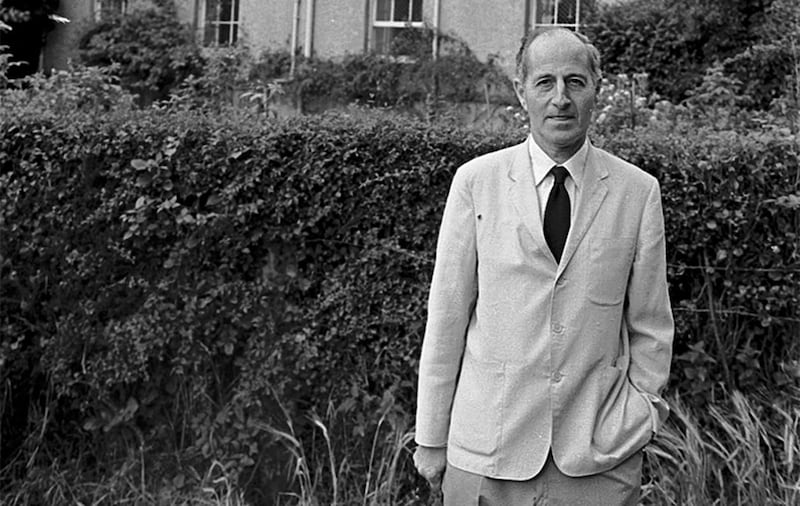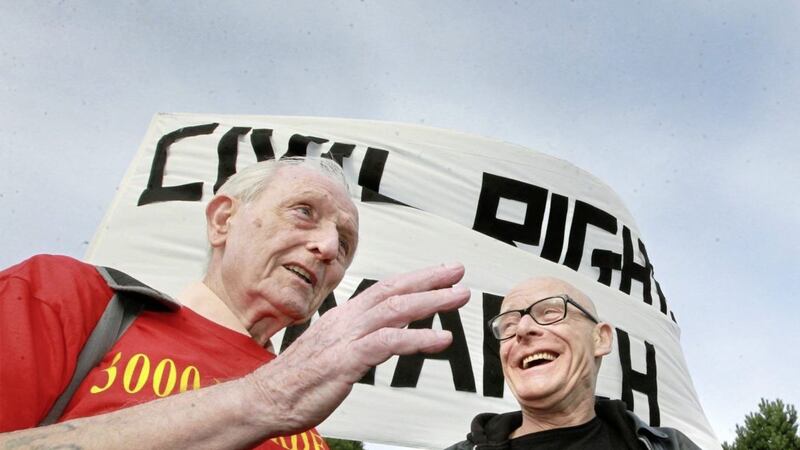RUC men on that Saturday fifty years ago blattered their way into history on camera, leaving newsprint catching-up as the Troubles, and the next week, began.
The Irish News had the simplest job. A new war correspondent grabbed the front page: Gerry Fitt ‘speaking from his bed where he was recuperating from his head wounds’ told them ABC phoned him from New York about the pictures from the scene they had ‘relayed to the American people.’
Tight little Northern Ireland had just been opened permanently in the worst possible light to outside opinion, by unionist bad judgment and pig-headedness. The unionist papers struggled.
Then at the peak of its moderate, reforming phase, the Belfast Telegraph had been eagerly portraying Stormont prime minister Captain Terence O’Neill as liberal, a gent, as against right-winger Bill Craig, Minister for Home Affairs, responsible for the RUC. In the Derry after-shock, O’Neill let the side down.

His instant response differed from Craig’s by not rampagingly free-associating about a communist IRA bomb plot and much-wanted man Cathal Goulding among the marchers. (Too late to arrest Goulding, said Craig, when police spotted him among photographs. No photo surfaced.)
O’Neill’s reaction brought his own limitations into focus. He was off in Leicester for a promotional ‘Ulster Week’, visiting the Royal Irish Rangers. Monday’s Tele reported him saying that when he “saw the news on Saturday night it looked to me as if the demonstrators were bashing the police over the head. But I think things probably hotted up a bit after that.”
It may be imagination to suspect a sub-editor’s subversive humour and honest reporting straining against editorial pomposity in the heading: ‘Things hotted up a bit – Premier.’
Read more:
- President Michael D Higgins pays tribute to civil rights' leaders
- Leona O'Neill: Those who commemorate IRA are no champions of civil rights in my eyes (premium)
- Patrick Murphy: Bigotry and ignorance destroyed brief period of enlightenment (premium)
A box in bold print had the heading ‘Children have broken arms’, reporting that the two civilians still in hospital were boys aged 10 and 14, plus two constables with knee injuries. But the Tele’s special front page Viewpoint said those who set out ‘to force their way’ through a police cordon had ‘no reason to be outraged when they find themselves in a rough house.’
The lead story, sharply written by John Wallace, picked up the instant challenge to Stormont from a Labour government already, pre-Derry, pressing O’Neill to redress discrimination. The headline was ‘Wilson wants Derry report’, meaning from British Home Secretary Jim Callaghan. (One of the minor oddities to a 2018 eye is the casual Tele and also News Letter alternation of Derry/Londonderry.)
O’Neill told a Leicester press conference an inquiry into the Derry riots was “unlikely” and attempts to get the British government to “interfere” would be self-defeating. (Bluster of his own? He had failed to talk self-protective sense into Craig and others in his cabinet, warning all the while of British impatience.)
He told his Leicester audience that ‘Ireland was a country where passions tend to run higher than in England... the Ulster police force does a very good job in extremely difficult circumstances.’ There had been a tendency in ‘Ireland (again, the modern eye notes, not ‘Northern Ireland’) for a nationalist local authority not to be over keen to house people who were Unionist. (Pardon?) I was hoping that the policies I have been trying to adopt were beginning to break things down.’ This was why he ‘deplored what happened on Saturday.’ He was afraid of the effect on the ‘more friendly relations beginning to grow between the two sections of the community.’
Fifty years on this sounds like a colonial administrator, flummoxed as minority natives become media favourites. No automatic respect for him in the Motherland either. At the march-past by a Royal Irish band, some students gave him ‘the Fascist salute.’
And O’Neill was the best of them. Or was he? That letter Stranmillis students unearthed lately from RUC Inspector General Sir Albert Kennedy to Craig, seven weeks after Derry, spotted precisely what would fuel violence, and overwhelm his force. A number ‘on the loyalist side’ made no distinction between the IRA and civil rights marchers, resulting in an opposition to peaceful marches that ‘could lead to armed conflict’ with the IRA exploiting the situation. ‘Death and destruction would be inevitable’.
People holding important public positions should explain that the ‘constitution is not in any danger from those who are protesting’ and refrain from public statements which ‘perhaps quite unintentionally’ inflamed passions. He might as well have told Craig to look in the mirror.
Craig never admitted being wrong about anything. Kennedy retired as 1969 began, lived until 1991, and kept his analysis to himself.









